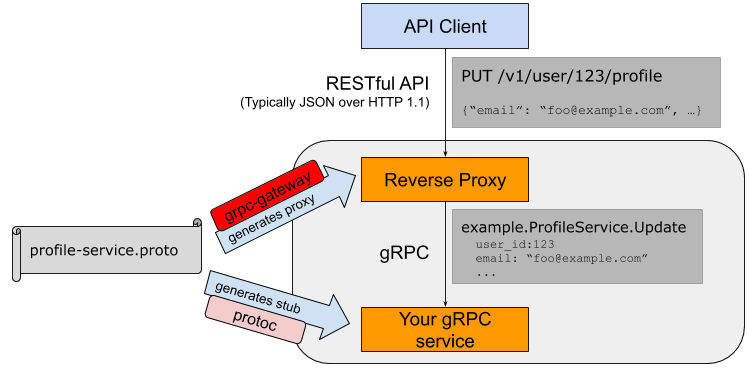grpc-gateway是Google protocol buffers系列化编译器protoc的插件。通过读取protobuf服务的定义,生成将RESTful json API请求转化为gRPC的反向代理。其通过protobuf中定义的google.api.http注释来生成。
grpc-gateway能同时提供gRPC和RESTful的APIs。

grpc-gateway架构图
grpc-gateway这个项目的目的是提供 HTTP+JSON 接口给你的gRPC服务。只需要在服务中加一点配置就能通过这个库产生反向代理。
安装
首先,需要本地安装了 protoc v3.00及以上。官方地址:
https://github.com/protocolbuffers/protobuf/releases
其次,需要安装grpc-gateway的包:
1 | go get -u github.com/grpc-ecosystem/grpc-gateway/protoc-gen-grpc-gateway |
下载完成后安装该项目,在$GOBIN下生成:
protoc-gen-grpc-gatewayprotoc-gen-grpc-swaggerprotoc-gen-go- 把$GOPATH加入到环境变量中
使用
我们可以新建一个grpc-gateway-demo项目
定义gRPC服务
首先,在grpc-gateway-demo目录下新建proto目录,在proto下新建your_service.proto:1
2
3
4
5
6
7
8
9
10
11
12
13
14
15
16
17
18
19
20
21
22
23
24
25
26
27syntax = "proto3";
package example;
message Embedded {
oneof mark {
int64 progress = 1;
string note = 2;
}
}
message StringMessage {
string id = 1;
int64 num = 2;
oneof code {
int64 line_num = 3;
string lang = 4;
}
Embedded status = 5;
oneof ext {
int64 en = 6;
Embedded no = 7;
}
}
service YourService {
rpc Echo(StringMessage) returns (StringMessage) {}
}
以上是一个传统的proto文件,使用grpc-gateway需要对其进行修改:1
2
3
4
5
6
7
8
9
10
11
12
13
14
15
16
17
18
19
20
21
22
23
24
25
26
27
28
29
30
31
32
33
34
35
36
37
38 syntax = "proto3";
package example;
+
+import "google/api/annotations.proto";
+
message Embedded {
oneof mark {
int64 progress = 1;
string note = 2;
}
}
message StringMessage {
string id = 1;
int64 num = 2;
oneof code {
int64 line_num = 3;
string lang = 4;
}
Embedded status = 5;
oneof ext {
int64 en = 6;
Embedded no = 7;
}
}
service YourService {
- rpc Echo(StringMessage) returns (StringMessage) {}
+ rpc Echo(StringMessage) returns (StringMessage) {
+ option (google.api.http) = {
+ post: "/v1/echo/{id}"
+ additional_bindings {
+ get: "/v1/echo/{id}/{num}"
+ }
+ };
+ }
}
其中-表示删除部分,+表示增加部分
另外还需要在proto文件下新建google/api目录,在其中新增annotations.proto和http.proto文件。
http.proto文件可以拷贝:
https://github.com/googleapis/googleapis/blob/master/google/api/http.proto
annotations.proto文件可以拷贝:
https://github.com/googleapis/googleapis/blob/master/google/api/annotations.proto
其次,生成给序列化文件,windows下生成.pb.go文件:1
protoc -IC:\Users\Leiying\go\bin -I. -IC:\Users\Leiying\go\src -IC:\Users\Leiying\go\src\github.com\grpc-ecosystem\grpc-gateway\third_party\googleapis --go_out=plugins=grpc:. your_service.proto
再生成反向代理,.pg.gw.go文件:1
protoc -IC:\Users\Leiying\go\bin -I. -IC:\Users\Leiying\go\src -IC:\Users\Leiying\go\src\github.com\grpc-ecosystem\grpc-gateway\third_party\googleapis --grpc-gateway_out=logtostderr=true:. your_service.proto
-I指定文件目录
执行完以上两步后生成:your_service.pb.go和 your_service.pb.gw.go
编写gateway服务
在grpc-gateway-demo目录下,新建cmd/example-grpc-gateway目录作为应用的入口
新建main.go文件:1
2
3
4
5
6
7
8
9
10
11
12
13
14
15
16
17
18
19
20
21var (
endpoint = flag.String("endpoint", "localhost:9090", "endpoint of the gRPC service")
network = flag.String("network", "tcp", `one of "tcp" or "unix". Must be consistent to -endpoint`)
)
func main() {
flag.Parse()
defer glog.Flush()
ctx := context.Background()
opts := gateway.Options{
Addr:":8080",
GRPCServer:gateway.Endpoint{
Network: *network,
Addr: *endpoint,
},
}
if err := gateway.Run(ctx, opts); err != nil {
glog.Fatal(err)
}
}
在grpc-gateway-demo目录下,新建gateway目录,编写gateway的主要逻辑,主要包括三个文件:main.go,gateway.go,handlers.go。
main.go:1
2
3
4
5
6
7
8
9
10
11
12
13
14
15
16
17
18
19
20
21
22
23
24
25
26
27
28
29
30
31
32
33
34
35
36
37
38
39
40
41
42
43
44
45
46
47
48
49
50
51
52
53type Endpoint struct {
Network, Addr string
}
type Options struct {
Addr string
GRPCServer Endpoint
Mux []runtime.ServeMuxOption
}
func Run(ctx context.Context, opt Options) error {
ctx , cancel := context.WithCancel(ctx)
defer cancel()
conn, err := dial(ctx, opt.GRPCServer.Network, opt.GRPCServer.Addr)
if err != nil {
return err
}
go func() {
<- ctx.Done()
if err := conn.Close(); err != nil {
glog.Errorf("Failed to close a client connection to gRPC server: %v", err)
}
}()
mux := http.NewServeMux()
mux.HandleFunc("/healthz", healthzServer(conn))
gw, err := newGateway(ctx, conn, opt.Mux)
if err != nil {
return err
}
mux.Handle("/", gw)
s := &http.Server{
Addr: opt.Addr,
Handler: allowCORS(mux),
}
go func() {
<- ctx.Done()
glog.Infof("Shutting down the http server")
if err := s.Shutdown(context.Background()); err != nil {
glog.Errorf("Failed to shutdown http server: %v", err)
}
}()
glog.Infof("Starting listening at %s", opt.Addr)
if err := s.ListenAndServe(); err != http.ErrServerClosed {
glog.Errorf("Failed to listen and serve: %v", err)
return err
}
return nil
}
gateway.go:1
2
3
4
5
6
7
8
9
10
11
12
13
14
15
16
17
18
19
20
21
22
23
24
25func newGateway(ctx context.Context, conn *grpc.ClientConn, opts []runtime.ServeMuxOption) (http.Handler, error) {
mux := runtime.NewServeMux(opts...)
for _, f := range []func(context.Context, *runtime.ServeMux, *grpc.ClientConn) error{
proto.RegisterYourServiceHandler,
} {
if err := f(ctx, mux, conn);err != nil {
return nil, err
}
}
return mux, nil
}
func dial(ctx context.Context, network, addr string) (*grpc.ClientConn, error) {
switch network {
case "tcp":
return dialTCP(ctx, addr)
default:
return nil, fmt.Errorf("unsupported network type %q", network)
}
}
func dialTCP(ctx context.Context, addr string) (*grpc.ClientConn, error){
return grpc.DialContext(ctx, addr, grpc.WithInsecure())
}
handlers.go:1
2
3
4
5
6
7
8
9
10
11
12
13
14
15
16
17
18
19
20
21
22
23
24
25
26
27
28
29
30
31func allowCORS(h http.Handler) http.Handler {
return http.HandlerFunc(func(w http.ResponseWriter, r *http.Request) {
if origin := r.Header.Get("Origin"); origin != "" {
w.Header().Set("Access-Control-Allow-Origin", origin)
if r.Method == "OPTIONS" && r.Header.Get("Access-Control-Request-Method") != ""{
preflightHandler(w, r)
return
}
}
h.ServeHTTP(w, r)
})
}
func preflightHandler(w http.ResponseWriter, r *http.Request) {
headers := []string{"Content-Type", "Accept"}
w.Header().Set("Access-Control-Allow-Headers", strings.Join(headers, ","))
methods := []string{"GET", "HEAD", "POST", "PUT", "DELETE"}
w.Header().Set("Access-Control-Allow-Methods", strings.Join(methods, ","))
glog.Infof("preflight request for %s", r.URL.Path)
}
func healthzServer(conn *grpc.ClientConn) http.HandlerFunc{
return func(w http.ResponseWriter, r *http.Request) {
w.Header().Set("Content-Type", "text/plain")
if s := conn.GetState(); s != connectivity.Ready {
http.Error(w, fmt.Sprintf("grpc server is %s", s), http.StatusBadGateway)
return
}
fmt.Fprintln(w, "ok")
}
}
此时可以启动cmd/example-grpc-gateway下的main.go服务了,使用 postman 发送post localhost:8080/v1/echo/123会报错,原因在于8080端口的gateway服务会将请求转化为gRPC请求,转发到9090端口的gRPC服务,但目前9090端口没有gRPC服务,下面新建一个gRPC服务。
新建gRPC服务
在cmd下新建example-grpc-server目录,作为服务入口:
main.go:1
2
3
4
5
6
7
8
9
10
11
12
13
14var (
addr = flag.String("addr", ":9090", "endpoint of the gRPC service")
network = flag.String("network", "tcp", "a valid network type which is consistent to addr")
)
func main() {
flag.Parse()
defer glog.Flush()
ctx := context.Background()
if err := server.Run(ctx, *network, *addr); err != nil {
glog.Fatal(err)
}
}
在grpc-gateway-demo下新建server目录,处理服务主逻辑,包含main.go,myserver.go两个文件。
main.go:1
2
3
4
5
6
7
8
9
10
11
12
13
14
15
16
17
18
19
20func Run(ctx context.Context, network, addr string) error {
l, err := net.Listen(network, addr)
if err != nil {
return err
}
defer func() {
if err := l.Close(); err != nil {
glog.Errorf("Failed to close %s %s: %v", network, addr, err)
}
}()
s := grpc.NewServer()
pb.RegisterYourServiceServer(s, newMyServer())
go func() {
defer s.GracefulStop()
<- ctx.Done()
}()
return s.Serve(l)
}
myserver.go实现yourservice接口:1
2
3
4
5
6
7
8
9
10type myserver struct{}
func newMyServer() pb.YourServiceServer {
return new(myserver)
}
func (myserver) Echo(ctx context.Context,msg *pb.StringMessage) (*pb.StringMessage, error) {
glog.Info(msg)
return msg, nil
}
启动服务,进行测试:
1 | # Visit the apis |